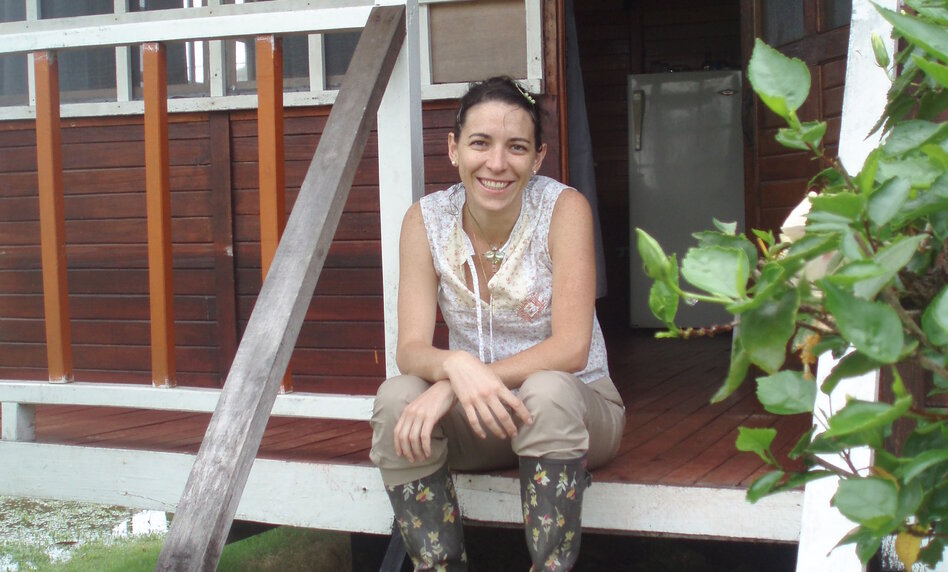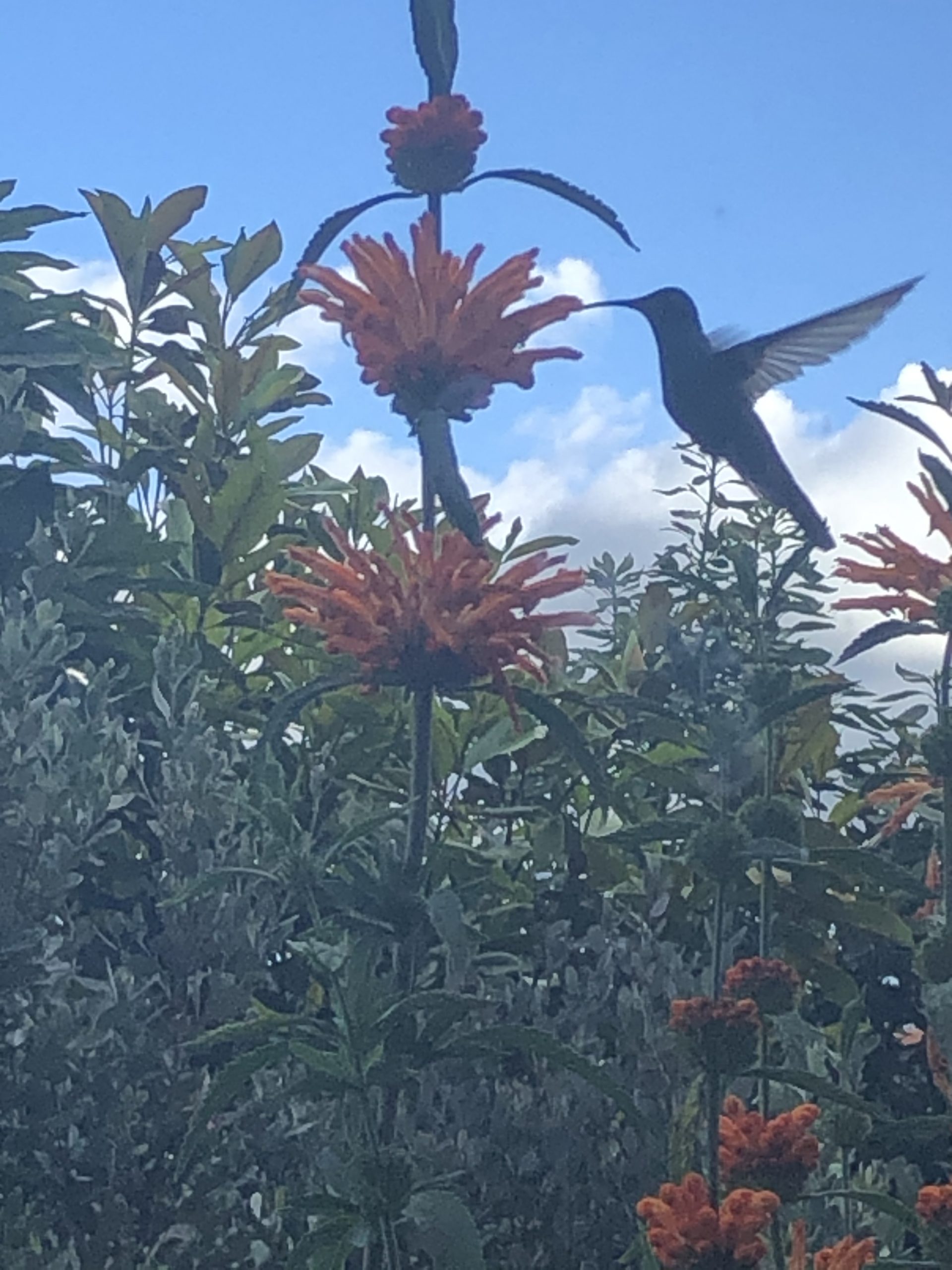
Carmen Lacambra Segura on Cambridge and co-founding a consultancy specialising in resilience and climate change adaptation
We’re a small consultancy competing against the big international players, but we are closer to the region we are working in and we know the area and the context very well.
Carmen Lacambra Segura
In the early 2000s when climate change was just emerging as a global issue, Carmen Lacambra Segura was working at the Marine and Coastal Research Institute [INVEMAR] in Santa Marta on the Caribbean coast of Colombia. The institute received visiting experts from around the “developed” world who would talk about how to deal with climate change. “The assumption seemed to be that what worked elsewhere would work in tropical countries,” says Carmen [2005]. That fired her imagination. “I wanted to understand extreme events better. I was interested in how nature responds to extremes in particular areas and how that knowledge can be used to reduce risks,” she says.
It was this interest that led to her PhD in Geography at Cambridge, investigating how nature responded to extreme events in the past, and it was Cambridge that opened her eyes to the possibility of starting up her own business – a consultancy specialising in resilience and climate change adaptation, highlighting innovative practice in Latin America and the Caribbean and working across sectors and with multiple stakeholders, universities, NGOs, international funds and small and medium sized businesses on practical solutions.
Carmen’s consultancy, Grupo Laera, which she co-founded in 2011 with her two brothers, has been working with a broad range of cutting-edge projects.
They include Resilient Central America which seeks to address food security and resilience to climate change through pilot projects that test innovative solutions based on natural ecosystems conservation and strengthening local economies. Grupo Laera’s role involves looking into the long-term impact of the projects and their relevance to strengthening climate resilience.
Another recent project is Private Markets for Climate Resilience, a global initiative to understand how the private sector is responding to climate change. Funded by the Nordic Development Fund and the InterAmerican Development Bank, it is described as “the first initiative by development institutions to better understand climate resilience solutions provided by the private sector”. It identifies best practice and business opportunities with regard to climate resilience in six developing countries, including Colombia.
Among other projects, Grupo Laera is also assessing and steering the Gran Chapo Proadapt project on climate adaptation. It covers three countries – Argentina, Paraguay and Bolivia – and brings together civil society organisations, the private sector, science and technology experts, local governments and national and international investors, covering everything from cattle farming to bee keeping.
Childhood
Carmen was born in Bogota, Colombia, to a Spanish father and Colombian mother. Her father, an engineer, worked on building Colombia’s cities aqueduct system. Her mother grew up at a time when it was rare for women to go to university or have a career and she enthusiastically supported her three children in their studies.
The family lived in “an amazing, remote house” on the outskirts of Bogota, but that didn’t prevent Carmen and her two brothers from socialising with their friends. From an early age, they were encouraged to travel independently and to be bilingual. The close-knit family spent summers in Carmen’s father’s home village of Graus, in the Spanish Pyrenees, and Carmen attended a Spanish school in Bogota. “My dad never really left Spain and he made sure that we were proud of Graus and our Spanish heritage,” says Carmen.
When she started school she already knew how to write and do maths so she was put in the second grade, with teachers expecting she would struggle at some point and rejoin her peers. But Carmen liked a challenge and not only did she not struggle, but she was consistently top of her class, meaning she left secondary school and started university at the age of just 16.
Carmen studied Biology at the Universidad de los Andes and opted for field biology which involved lots of hands-on research. She was keen to study something that meant she wouldn’t end up behind a desk. At the time, doing fieldwork in the Colombian jungle was extremely dangerous, given the violence situation in the country, but her parents had always encouraged Carmen to be adventurous and follow what she was interested in. Her five-year course involved research in different ecosystems, from the jungle to the desert and a survival course in the wilderness where she had to learn how to light a fire with her bare hands.
At university, Carmen was also very involved in sport, playing football and volleyball and doing scuba diving and she continued the voluntary work she had been doing with her family since the age of five with nuns in disadvantaged areas of Bogota. The nuns and her mother were Carmen’s female role models. “They were always happy, independent and resourceful in the way they helped and empowered disadvantaged communities,” she says.
She left university with the aim of joining the Navy and becoming a sailor, having always been fascinated by the ocean, a fascination in part linked to the fact that Bogota is 8,675 feet above sea level. After working with the Navy as a contractor, however, she soon realised that the environment and strict adherence to authority were not for her.
Through her work, she found out about a master’s course at the University of Hull in coastal zone management. Her parents remortgaged their house and family friends chipped in to help with the financial costs. Carmen also secured some scholarship money to do the course and worked as a coastal ecologist after finishing her studies to pay back the remaining money.
She says her master’s course was “a wonderful character-building experience” and that her supervisors were very supportive. Eventually, however, she decided to return to Colombia, via Africa, to work at INVEMAR. She describes the setting as being perfect for her work on conservation. Out of her office window she could see the coral reefs teeming with fish in the middle of Santa Marta port.
Cambridge
 After working at INVEMAR for some time and listening to the visiting experts, Carmen decided she needed to further her studies and applied to the Chevening programme to do an internship for the World Conservation Monitoring Centre in Cambridge. She won a place with other young professionals from around the world, from Mongolia to the Maldives. There she worked under Dr Gerardo Fragoso, head of the species programme. He encouraged Carmen to apply to Cambridge and introduced her to Professor Tom Spencer and Professor Iris Möller, who would become her supervisors. They had similar interests in how different ecosystems respond to extreme events and how biodiversity could play a key role in coastal areas that are particularly affected by such events.
After working at INVEMAR for some time and listening to the visiting experts, Carmen decided she needed to further her studies and applied to the Chevening programme to do an internship for the World Conservation Monitoring Centre in Cambridge. She won a place with other young professionals from around the world, from Mongolia to the Maldives. There she worked under Dr Gerardo Fragoso, head of the species programme. He encouraged Carmen to apply to Cambridge and introduced her to Professor Tom Spencer and Professor Iris Möller, who would become her supervisors. They had similar interests in how different ecosystems respond to extreme events and how biodiversity could play a key role in coastal areas that are particularly affected by such events.
Carmen put in a research proposal for her PhD which was accepted. She just needed to secure the necessary funding. While she was doing so, she stayed on at the WCMC as a junior consultant, encouraged to persevere with her research topic by her colleagues. Then in December 2004 the Indian Ocean earthquake and tsunami happened. It underlined the need for the research Carmen was proposing and coincided with her application for a Gates Cambridge scholarship. She began her PhD in 2005.
At Cambridge Carmen had a lot of freedom to develop her research and worked on the Colombian Caribbean and Pacific shorelines, tracking backwards to see how coastal zones have changed in line with extreme events, including hurricanes and tsunamis. She spent a lot of time in the archives doing detective work, piecing together how ecosystems had responded to the worst effects of extreme weather. Given the burgeoning interest in ecosystems at the time, Carmen had several published articles in academic journals before she finished her research.
She not only enjoyed her research, but also her time at Cambridge. “The amount of talent – and kindness – in one place was very humbling,” she says. “You could hear from Nobel Prize winners regularly and go to parties with opera singers, classical musicians and professional Flamenco dancers who were also doing their PhDs. It is very international – a hub for diversity – and having the Gates Cambridge scholarship meant I could focus fully on my research. I didn’t want it to end.” As part of St Edmund’s college, Carmen played in the women’s football team and enjoyed training with team members from all over the world. The team went from losing heavily to winning some of their matches. Each Sunday she had coffee after mass with a congregation of people to whom she became very close during her time at Cambridge. All her godchildren are the result of friendships during her years at Cambridge.
Carmen also took part in a Judge Business School programme on entrepreneurship which opened her eyes to the possibility of another path after her PhD – she had previously thought the only paths available to her as an ecologist were working in academia, as a government contractor, in multilateral organisations or international NGOs. “I started thinking maybe I could set up my own business, reaching areas and actors that other institutions might not reach, and also linking with other highly qualified individuals across the developing world to better understand the local impact of global challenges,” she says.
Consultancy work
In 2011, she decided to set up Grupo Laera with her brothers and partnered with climate change experts in Oxford (Global Climate Adaptation Partnership – GCAP), providing on-the-ground data and knowledge about the situation in Latin America. The consultancy has since worked on many projects and has got funding from a range of organisations, including the UK’s Natural Environment Research Council, to build resilient ecosystems in Latin America. Carmen says her PhD and its focus on historical developments is still helpful in her current work by providing solid evidence of climate adaptation in the past.
She has also kept up her links with Cambridge – she says she never really left Cambridge and has strong emotional ties to the UK. Only recently she hired a director to work on a film with the universities of Cambridge, York and Southampton which showcases the communities Grupo Laera is working with, giving them a voice that research papers don’t.
The company is keen to continue working on innovative projects, supporting small and medium sized businesses on short-term, financially viable solutions. “What we propose has to be sustainable all round,” says Carmen. She adds: “We’re a small consultancy competing against the big international players, but we are closer to the region we are working in and we know the area and the context very well. Being small allows us the flexibility to partner with the best, globally and locally.”












